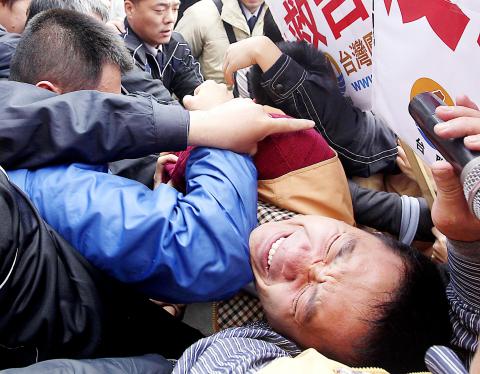After a week-long trip around Taiwan dogged by persistent protests, China’s Association for Relations Across the Taiwan Straits (ARATS) Chairman Chen Deming (陳德銘) returned to Taipei yesterday to attend the annual Cross-Strait CEO Summit — only to be greeted by more demonstrations.
Although the summit purports to facilitate business relationships across the Taiwan Strait, critics say the meeting in effect allows the Chinese Nationalist Party (KMT) and Chinese Communist Party (CCP) to formulate decisions on cross-strait trade policies while circumventing legislative and administrative procedures.
Three separate rallies — led by the Taiwan Solidarity Union (TSU), pro-independence groups and youth activist organizations — took place outside the summit’s venue in Taipei’s Xinyi District (信義), while more than 800 business and political heavyweights from both sides of the Taiwan Strait gathered inside.

Photo: Reuters
Among the attendees at the two-day event are former vice president Vincent Siew (蕭萬長) and former Chinese vice premier Zeng Peiyan (曾培炎), who both spoke at the summit’s opening ceremony.
Business leaders participating in the summit include Jack Ma (馬雲), founder of the Chinese e-commerce giant Alibaba; Sinopec Group senior vice president Dai Houliang (戴厚良); Taiwan Semiconductor Manufacturing Co chairman Morris Chang (張忠謀); and Acer Corp founder Stan Shih (施振榮).
Scuffles with police occurred as protesters from a rally organized by the Taiwan Solidarity Union attempted to inch closer to the venue, resulting in TSU Department of Organization Deputy Director Chang Chao-lin (張兆林) being taken away by police for questioning.
Protesters from a rally led by pro-independence groups congregated across the street, waving towering flags that measured up to three stories high, emblazoned with pro-independence slogans.
A prerecorded track that chanted: “The communist livestock have arrived; the Chinese communist robbers have arrived,” blasted repeatedly through loudspeakers aimed toward the venue.
Economic Democracy Union convener Lai Chung-chiang (賴中強) led a third rally, shouting slogans that denounced participants in the summit as members of the “cross-strait privileged stratum.”
Lai was joined by members of several youth organizations that blossomed following the Sunflower movement in late March and April, in which students and activists occupied the Legislative Yuan’s main chamber for 23 days to protest the government’s handling of a proposed cross-strait service trade agreement.
With important officials from the KMT and the CCP present, Lai said the summit can be seen as an example of the party-to-party negotiation mechanism established during the KMT-CCP forum in 2005, adding that such an arrangement bypasses legal procedures required by Taiwanese law.
The summit touches on many issues that are still under legislative deliberation, Lai said, including draft bills for the proposed free economic pilot zones, as well as cross-strait cooperation in medical and biotechnological industries.
“By conducting negotiations with Chinese authorities without the approval of the Mainland Affairs Council, participants in the summit have broken the law,” Lai said. “Vincent Siew and [former Straits Exchange Foundation chairman] Chiang Pin-kun (江丙坤) should take responsibility for their criminal behavior.”
The protesters offered organizers of the summit a prop of a “moonflower,” referring to Chen’s remarks last week that cautioned against the occurrence of a “Moonflower” movement — a hypothetical sequel to the Sunflower movement — to ensure that the cross-strait trade agreement passes soon.

Chinese spouse and influencer Guan Guan’s (關關) residency permit has been revoked for repeatedly posting pro-China videos that threaten national security, the National Immigration Agency confirmed today. Guan Guan has said many controversial statements in her videos posted to Douyin (抖音), including “the red flag will soon be painted all over Taiwan” and “Taiwan is an inseparable part of China,” and expressing hope for expedited reunification. The agency last year received multiple reports alleging that Guan Guan had advocated for armed reunification. After verifying the reports, the agency last month issued a notice requiring her to appear and explain her actions. Guan

GIVE AND TAKE: Blood demand continues to rise each year, while fewer young donors are available due to the nation’s falling birthrate, a doctor said Blood donors can redeem points earned from donations to obtain limited edition Formosan black bear travel mugs, the Kaohsiung Blood Center said yesterday, as it announced a goal of stocking 20,000 units of blood prior to the Lunar New Year. The last month of the lunar year is National Blood Donation Month, when local centers seek to stockpile blood for use during the Lunar New Year holiday. The blood demand in southern Taiwan — including Tainan and Kaohsiung, as well as Chiayi, Pingtung, Penghu and Taitung counties — is about 2,000 units per day, the center said. The donation campaign aims to boost

The Kaohsiung Tourism Bureau audited six hotels in an effort to prevent price gouging ahead of Korean band BTS’ concert tour in the city scheduled for Nov. 19, 21 and 22 this year. The bureau on Friday said that the audits — conducted in response to allegations of unfair pricing posted on social media — found no wrongdoing. These establishments included the local branches of Chateau de Chine, Hotel Nikko, My Humble House, and Grand Hai Lai, it said, adding that the Consumer Protection Commission would have penalized price gougers had the accusations been substantiated. The bureau said the Tourism Development Act

The Central Weather Administration (CWA) said a magnitude 4.9 earthquake that struck off the coast of eastern Taiwan yesterday was an independent event and part of a stress-adjustment process. The earthquake occurred at 4:47pm, with its epicenter at sea about 45.4km south of Yilan County Hall at a depth of 5.9km, the CWA said. The quake's intensity, which gauges the actual effects of a temblor, was highest in several townships in Yilan and neighboring Hualien County, where it measured 4 on Taiwan's seven-tier intensity scale, the CWA said. Lin Po-yu (林柏佑), a division chief at the CWA's Seismological Center, told a news conference